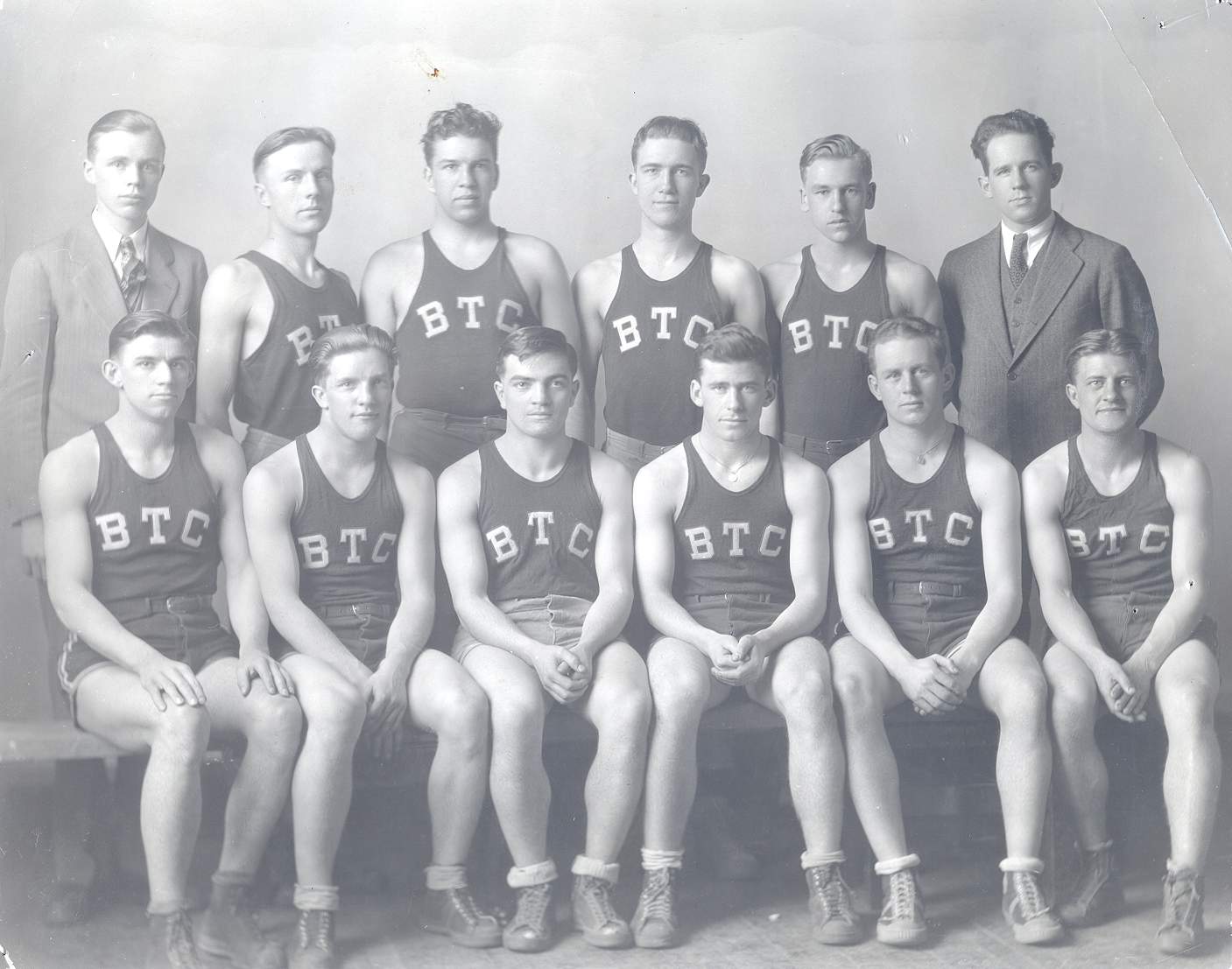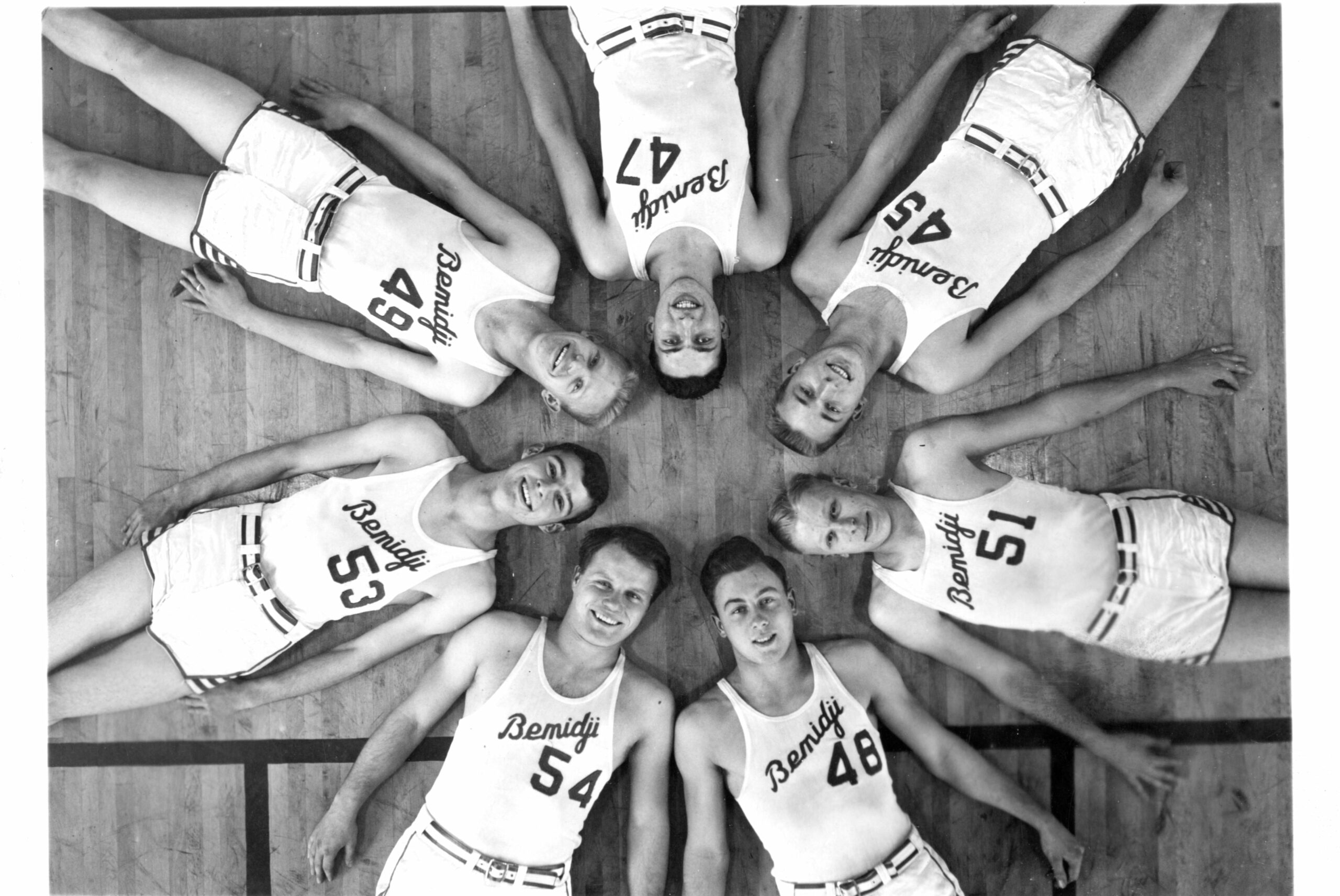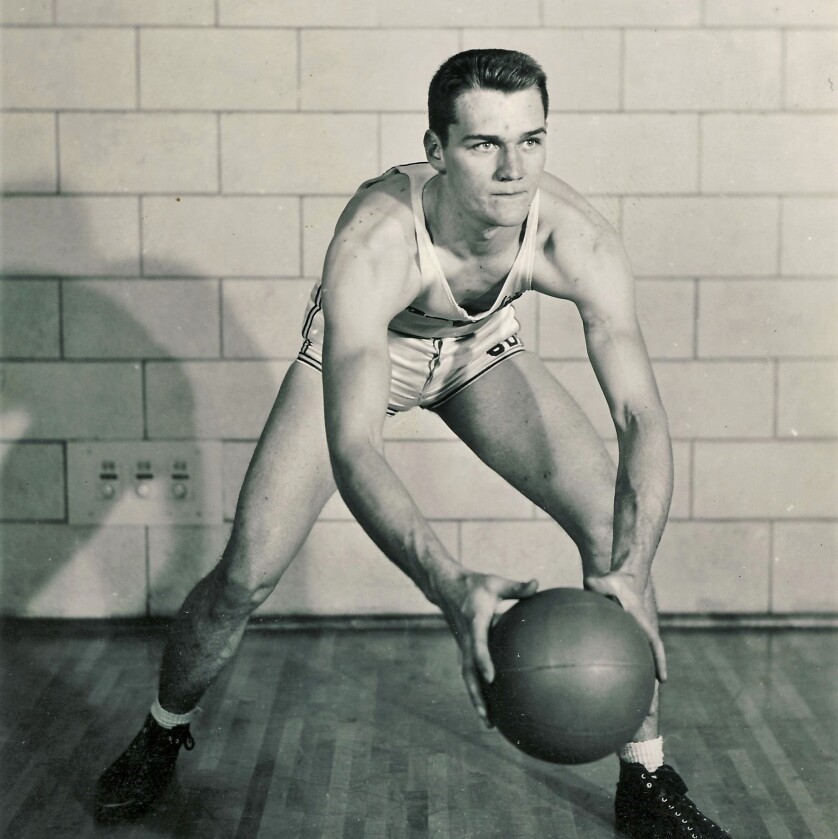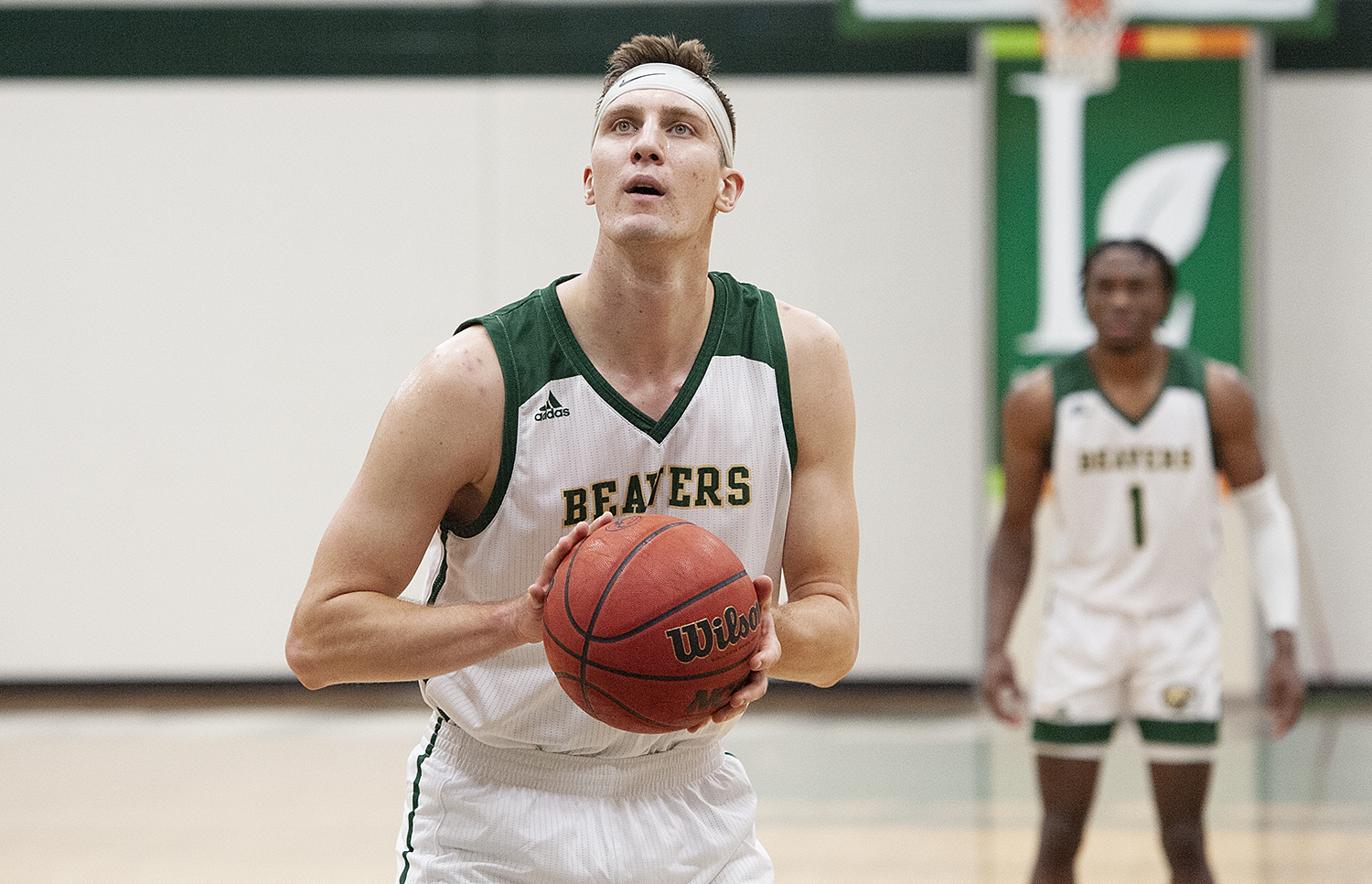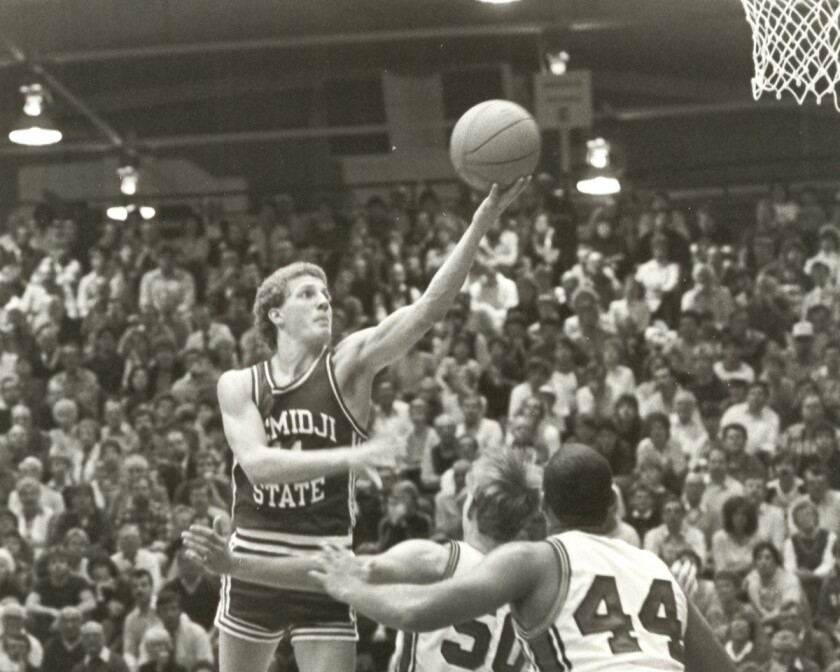
By The Bemidji Pioneer
Published 7:00 a.m. on Dec. 15, 2021
One hundred years ago today, Bemidji State Teachers College explored a new venture for the very first time: fielding a basketball team.
“Under the tutelage of Coach F. P. Wirth, the team has been whipped into first-class condition,” the Bemidji Daily Pioneer heralded. In another edition, the newspaper declared that Wirth “has developed a formidable squad and indications are that the school will stand its own against any school in this section of the state.”
Bemidji already had a high school basketball team and two city clubs (the Naval Militia unit and Company K of the Minnesota National Guard), but there was a particular air of excitement at the prospect of a college squad.
The original roster featured 10 trailblazers: captain Wilbur Horns, Richard Romens, “Tommy” Simons, William Elliott, Percy Riggs, Adolph Bergland, Eugene Paul, Theodore Hermes, Stanley Wilcox and a player identified only by his last name, Greenfield.
The BSTC quint took it to Kelliher High School by a 51-11 score in its inaugural game on Dec. 15, 1921 -- one officiated by the Kelliher coach, no less. The startup season ended with a 6-12 record, but that team undoubtedly couldn’t see what was coming: another 99 seasons, more than 1,000 wins and a record book stocked full of legends.
“Considering that this past season was the first in which the Bemidji State Teachers college had a basket ball team in the field, the squad made a very creditable showing,” the Pioneer analyzed. “… There is every indication that a first-class outfit can be developed.”
A vintage venture
Bemidji Normal School was founded in 1919. Two years later, a new sport called “Basket Ball” arrived on campus.
“Basketball has changed drastically,” current BSU head coach Mike Boschee said. “Going from a peach basket to the hoops we use now, it’s unbelievable how much the game has changed over the years.”
And as the sport evolved, the team’s history books grew.
The team moved its home games from the downtown armory to present-day Memorial Hall in 1940, then to the current BSU Gymnasium in 1960.
The schedule has featured some interesting quirks over the years, including an all-time 16-17 record against high school teams and a shortened 1943-44 season due to World War II. The school didn’t field a varsity team in 1922-23, but it was back for a 6-3 campaign in 1923-24.
The Beavers even almost played the Globetrotters in 1935, but Harlem’s bus crashed on the way to town and ultimately canceled the highly anticipated showdown.
The longest game in program history came in 2009, when Minnesota Duluth prevailed 126-124 in four overtimes (which also set a conference record with 250 combined points). Yet some may argue that an 8-5 loss to Bear Cats College in 1926 – the lowest-scoring game in program history – was much, much longer.
As a charter member of what has evolved into the Northern Sun Intercollegiate Conference, Bemidji State won six titles in the Northern Intercollegiate Conference (1940, 1941, 1942, 1951, 1952, 1957 and 1967) and another two championships in the NSIC (2004 and 2012). The latest two crowns also came with trips to the Division II NCAA Tournament.
All-American Arnie Johnson dominated between 1938-42, leading Bemidji Teachers to three straight conference titles before becoming the only Beaver to reach the NBA.
Irv St. John was the school’s first 1,000-point scorer in 1953-54, founding a club that now includes 19 members.
More legends came through over the years, like all-time leading scorer David Lee (1984-88) and D-II national player of the year James Ellisor (2010-12). Karl Salscheider guided the program for 13 seasons between 1981 and 1995 and is Bemidji State’s winningest coach with 147 victories.
The 3-point line and shot clock arrived in the 1980s, and BSU transitioned from NAIA to Division II a decade later.
The Beavers earned their 1,000th win in January 2018, and last winter, Derek Thompson set a single-game scoring record with 45 points in the season finale of the program’s 99th year.
In all, 62 members of the Bemidji State Athletic Hall of Fame hail from the men’s basketball program.
“There have been a lot of people before us – coaches and players – who have set that foundation,” Boschee said. “Obviously this current team here wants to build off that and make our alumni proud.”
Repping with pride
X’s and O’s have changed time and time again at Bemidji State.
Gone are the days of high school opponents and final scores lower than the winter temperatures. The incorporation of the 3-point line changed the game once more in the mid-1980s, and analytics and efficiency have dominated strategy in recent years.
But one constant through it all has been a common sense of pride that came with donning the Beavers’ green and white.
“A lot of players had a lot of pride playing for Bemidji,” said David Lee, BSU’s all-time leading scorer. “Coach (Karl) Salscheider really instilled that in us with work ethic and representing Bemidji State in a positive way. We really wanted to put out our best effort and represent the university the best we could.”
Lee scored 2,034 points for the Beavers, a number nobody has touched in the 34 seasons since he left the program. He’s had plenty of time to reflect on his BSU career, and it’s an era he remembers fondly.
“Bemidji was a great place for me to go,” he said. “It gave me a great experience there playing basketball, and I got my education. … It was a phenomenal experience for me there in many ways.”
He isn’t alone in that sentiment, either. Before Steve Vogel went on to teach anatomy and physiology at the university, he pulled down a program-record 694 rebounds for the Beavers from 1974-78. (Editor's note: This record has since been broken by Derek Thompson's 723 career rebounds.) Vogel recalls the camaraderie shared among teammates.
“It was very much a team that not only worked together but really cared about one another,” Vogel said. “It was so much fun. We were out there playing as hard as we could, as much for each other as anyone else.”
Vogel’s rebounding record has stood for more than four decades, but he said “it’s a record that needs to be broken.” He may get his wish, as current fifth-year senior Derek Thompson has 598 rebounds and is on track to reach Vogel’s total.
“I would think he’s absolutely going to break it,” Vogel said with hope in his voice. “It’s been way too long.”
Bryce Tesdahl views his BSU tenure through similar rose-colored glasses. And he should, too, because Tesdahl led the team to a conference title, an NCAA Tournament berth and a program-record 22 wins in 2012. He walked away as Bemidji State’s all-time leader in assists with 561, shattering Lee’s previous record of 314.
“To take a program from maybe ground zero to the top was a rewarding process,” Tesdahl said. “I’m proud to be a Beaver. The university, the basketball program and the Bemidji community as a whole treated me so well.”
Same team, different ties
As their numbers can attest, Lee, Vogel and Tesdahl are three pillars of Beaver basketball. But all three have had wide-ranging experiences before and after their BSU days.
For example, Vogel was first a Lumberjack who won a state championship with Bemidji High School in 1974. He had a team-high 16 points alongside nine rebounds in the championship game, a 52-50 win over Richfield.
“I’m not singling out any kid for glory but I felt that Vogel grew with each game at the state,” Pioneer columnist Cliff Morlan scribed. “It was his blocked shot on Paul Meissner with less than a minute left that preserved the victory.”
Then there’s Tesdahl, who hails from the legendary McDonald family. Bryce’s grandfather, Bob McDonald, is the winningest coach in Minnesota high school sports history with 1,012 victories.
From Bob, a royal bloodline of McDonald coaches began to spread throughout the state, mostly on the Iron Range. The family tree includes Tesdahl, now the head boys basketball coach at Minnetonka High School.
And Lee stayed connected to the Beavers a generation later as his daughters Morgan and Tatum joined the women’s program. He even watched as two BSU men’s players – Jake Schalow and Zach Noreen – were recruited to the family when they married Morgan and Tatum, respectively.
“I was able to watch the men’s program and the women’s,” David Lee said. “The men’s program had some outstanding teams in that era. … It was really good to get back and see them play, get back in that gym.”
Over the decades, hundreds of athletes have passed through the Bemidji State locker room. It’s true that only a select few have tied their names to school records, but affection from around town has been spread generously throughout the century.
For all that Tesdahl invested into Bemidji, he said the city gave it right back to him.
“The community embraced me,” Tesdahl said. “From the people I’m still connected with up there and obviously the teammates and friends I’ve made, it’s one place we always love to go back to.”
Perhaps nobody knows that bond better than Vogel, who grew up inside the old Carr Lake Schoolhouse and rose into a program legend on the other side of town.
“Bemidji is an incredible town for sports. It just absolutely loves its athletes and its programs,” Vogel said. “But it’s not in the sense that you might have in (a big city). It was in the sense of family. This is our town, these are our boys.”
Written by Micah Friez

KEEP READING:

